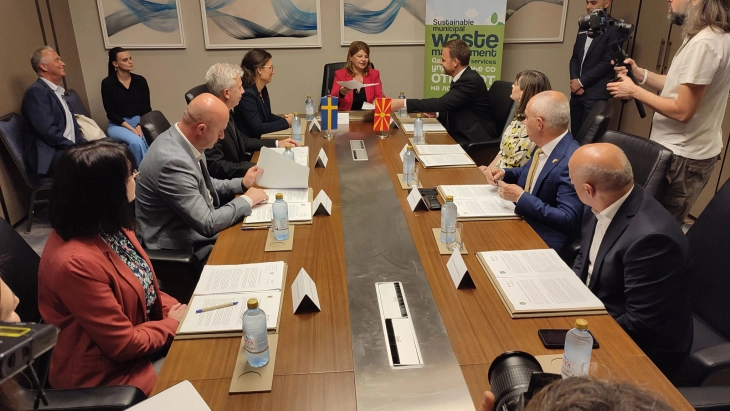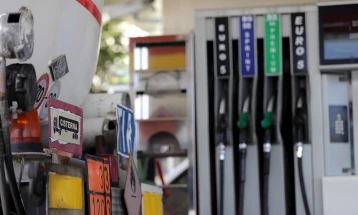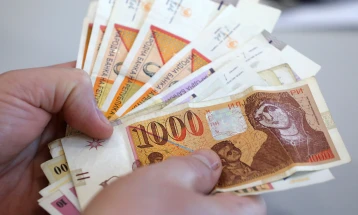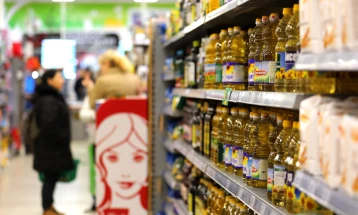Six municipalities from Southwest and Pelagonija region to work on sustainable waste management
- The Ministry of Environment and Physical Planning is involved in the process of establishing sustainable waste management as a main priority that ensures sustainable development of the state, quality of life for citizens, and harmonization of environmental policies and practices, taking into consideration our efforts to join the EU, said Minister for Environment and Physical Planning Kaja Shukova at the launch conference of project "Sustainable Local Waste Management" on June 5 - World Environment Day.
- Post By Ivan Kolekevski
- 15:46, 5 June, 2023

Skopje, 5 June 2023 (MIA) - The Ministry of Environment and Physical Planning is involved in the process of establishing sustainable waste management as a main priority that ensures sustainable development of the state, quality of life for citizens, and harmonization of environmental policies and practices, taking into consideration our efforts to join the EU, said Minister for Environment and Physical Planning Kaja Shukova at the launch conference of project "Sustainable Local Waste Management" on June 5 - World Environment Day.
Minister Shukova assessed that progress has been achieved in all planning regions, especially in the Eastern and Northwestern, and the tender for construction of a sanitary landfill and transfer stations will be announced soon with EU's help.
"These two regions will have a sanitary landfill in Sveti Nikole, and progress is being made in other regions as well. We are faced with many challenges and the implementation of these regional systems is a challenge in itself, but the many partners involved, especially the municipalities, should make great efforts for the establishment of these systems," Shukova said.

The project will be aimed at supporting the municipalities of the Pelagonija and Southwest planning regions, and the good outcomes of this project are expected to multiply in other regions as well, i.e. in building capacities and strengthening cooperation.
"We are aware of the financial and technical capacities of municipalities, which have the main role in the functioning of the waste collection and disposal system, and at this moment they are not at a satisfactory level. Progress has been made in recent years, which is why the Government and the Environment Ministry will give their full support for the project," Minister Shukova stressed.
Swedish Ambassador, Ami Larsson Jain stated that municipalities have a key role in leading the transformation toward a circular economy and a healthy environment. Municipalities are leaders in implementing polices, have an in-depth knowledge of the circumstances in the communities, and know how to foster joint responsibility and raise awareness among the population.
"Sweden will continue to support the transition toward a more prosperous, cleaner, and greener North Macedonia. We have 20 percent increase in our annual budgets and we provide and support projects in the amount of EUR 7 million this year.

Dushica Perishikj, executive director of the Association of the Units of Local Self-Government (ZELS) said that waste management is one of the most important tasks of local self-government units and is a service municipalities should provide for their citizens.
"Support for raising awareness for waste selection, strengthening capacities of local governments, and the provision of appropriate and quality equipment for waster selection and transport are important parts in the process. Nevertheless, the most important of all is implementing legal provisions and non-selective application of penalties for environment endangerment," Perisic stated.
Ryan Knox, managing director SALAR International, said that the exponential growth of waste requires cooperation, innovative ideas and changes in practices to ensure a more sustainable future. Adopting a holistic approach, the project will have different management, i.e. on a local, regional, and national level.
The project will support six selected municipalities in the Southwest and Pelagonija regions in the waste management planning process, and implementation of plans. It will work with municipal administrations, local public utility companies, and citizens from the chosen municipalities to improve the waste management practices and strengthen capacities to provide inclusive and sustainable waste management services. The project will also support the remaining 12 municipalities from both regions though the development of local action plans (LAP), sharing practices, and implementing models for better inter-municipal cooperation and coordination.
SALAR international, the selected municipalities from the Southwest and Pelagonija regions (Bitola, Prilep, Novaci, Ohrid, Kichevo, and Plasnica), the Environment Ministry, the Ministry of Local Self-Government and ZELS signed memoranda that marked the beginning of the project implementation on a local level.
Project "Sustainable Local Waste Management" is financed by the Swedish International Development Cooperation Agency (SIDA), and implemented by the Swedish Association of Local Authorities and Regions (SALAR) and its subsidiary SALAR International. ssh/ik/
Photo: MIA







